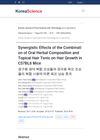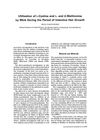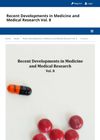 5 citations,
September 2017 in “Plastic and Aesthetic Research”
5 citations,
September 2017 in “Plastic and Aesthetic Research” Low dose cyclical nutrition therapy can consistently and safely improve hair growth and density without needing anti-androgens.
 9 citations,
June 2020 in “Tissue Engineering and Regenerative Medicine”
9 citations,
June 2020 in “Tissue Engineering and Regenerative Medicine” HHORSC exosomes and PL improve hair growth treatment outcomes.
[object Object] 11 citations,
March 2020 in “The journal of investigative dermatology/Journal of investigative dermatology” A specific group of skin stem cells was found to help maintain hair follicle cells.
 2 citations,
October 2020 in “The Journal of clinical and aesthetic dermatology”
2 citations,
October 2020 in “The Journal of clinical and aesthetic dermatology” The herbal mix (Biochanin A, Acetyl tetrapeptide-3, and Ginseng Extracts) and the 3% Minoxidil solution are equally effective in treating hair loss, but the herbal mix has fewer side effects.
 August 2024 in “International Journal of Molecular Sciences”
August 2024 in “International Journal of Molecular Sciences” Androgenetic alopecia involves immune cell disruptions, especially increased CD4+ T cells around hair follicles.
 11 citations,
February 2018 in “Archives of Pharmacal Research”
11 citations,
February 2018 in “Archives of Pharmacal Research” Finasteride reduces melanin production, possibly treating hyperpigmentation and melanoma, but needs more safety research.
 2 citations,
November 2017 in “Food Additives & Contaminants: Part A”
2 citations,
November 2017 in “Food Additives & Contaminants: Part A” The new method accurately detects illegal hair-growth drugs in dietary supplements.
January 2018 in “Food Additives and Contaminants Part A-chemistry Analysis Control Exposure & Risk Assessment” Researchers developed a precise method to detect illegal hair-growth drugs in dietary supplements.
 3 citations,
May 2018 in “Journal of nutritional health & food science”
3 citations,
May 2018 in “Journal of nutritional health & food science” Nutritional supplements can help manage hair loss and promote hair growth by strengthening hair roots and countering harmful effects of pollution, smoking, and deficiencies in vitamins and minerals.
 1 citations,
April 2012 in “Korean Journal of Food Science and Technology”
1 citations,
April 2012 in “Korean Journal of Food Science and Technology” Using both oral herbal supplements and hair tonic together works better for hair growth than using just the tonic.
 78 citations,
January 2017 in “Skin appendage disorders”
78 citations,
January 2017 in “Skin appendage disorders” Biotin supplements may improve hair and nail growth in people with certain deficiencies or conditions, but there's not enough evidence to recommend it for healthy individuals.
38 citations,
May 2000 in “Livestock production science” Giving high-quality protein or methionine supplements helps improve hair growth in Angora goats and, to a lesser extent, in Cashmere goats.
Instagram ads for skin, hair, and nail supplements often make broad health claims without clear ingredient information, and are not FDA-regulated.

The conclusion is that hair supplement ingredients may be unsafe and should be disclosed and proven safe before use.
[object Object] September 2017 in “Springer eBooks” Certain supplements, like whey protein isolate and growth hormones, can worsen hair loss.
 July 2022 in “Hair transplant forum international”
July 2022 in “Hair transplant forum international” Vitamin D might be involved in hair growth, so taking supplements could help treat hair loss if you're deficient.
 August 2016 in “Journal of Investigative Dermatology”
August 2016 in “Journal of Investigative Dermatology” Zinc deficiency disrupts hair growth and cycle, but zinc supplements can fix this.
 7 citations,
January 1982 in “Acta agriculturae Scandinavica”
7 citations,
January 1982 in “Acta agriculturae Scandinavica” Mink use L-methionine and L-cystine slightly better than natural amino acids for hair growth, but D-methionine is not effective.
 January 2024 in “Biomedical journal of scientific & technical research”
January 2024 in “Biomedical journal of scientific & technical research” Vitamins A, B7, C, D, and E are essential for healthy hair growth and preventing damage.
 98 citations,
October 2012 in “Dermatologic Clinics”
98 citations,
October 2012 in “Dermatologic Clinics” Eating the right nutrients can improve hair health, but taking extra supplements usually doesn't help unless you have a deficiency.
 3 citations,
February 2020 in “International journal of women’s dermatology”
3 citations,
February 2020 in “International journal of women’s dermatology” Most women with hair loss take more supplements than average, but these often don't help and can be risky and costly.
 18 citations,
September 2011 in “Livestock science”
18 citations,
September 2011 in “Livestock science” Maternal Nano-Se supplements improve fetal hair follicle development in cashmere goats.
 1 citations,
January 2015 in “Hair therapy & transplantation”
1 citations,
January 2015 in “Hair therapy & transplantation” Some supplements and hormones can increase hair loss by raising DHT levels.
 July 2024 in “Journal of Cosmetic Dermatology”
July 2024 in “Journal of Cosmetic Dermatology” Vegan collagen builder improves hair growth, skin smoothness, and reduces wrinkles and pain.
April 2022 in “DOAJ (DOAJ: Directory of Open Access Journals)” Effective hair regrowth after COVID-19 involves psychological support, good nutrition, and hair growth treatments.
 October 2021 in “Book Publisher International (a part of SCIENCEDOMAIN International)”
October 2021 in “Book Publisher International (a part of SCIENCEDOMAIN International)” Antioxidants and growth factors may help treat hair loss when combined with LED and Laser therapy.
 January 2018 in “Journal of general practice”
January 2018 in “Journal of general practice” Young people are losing hair due to stress, poor diet, pollution, and lack of sleep, but it can be treated with supplements and scalp treatments.
 13 citations,
January 2016 in “Journal of cosmetology & trichology”
13 citations,
January 2016 in “Journal of cosmetology & trichology” Alternative treatments show promise for hair growth beyond traditional methods.
 January 2022 in “Clinical Cases in Dermatology”
January 2022 in “Clinical Cases in Dermatology” Lack of certain nutrients may contribute to hair loss and proper diet or supplements could improve it.
 November 2023 in “Materials Today Bio”
November 2023 in “Materials Today Bio” Light therapy might help treat hereditary hair loss by improving hair follicle growth in lab cultures.























